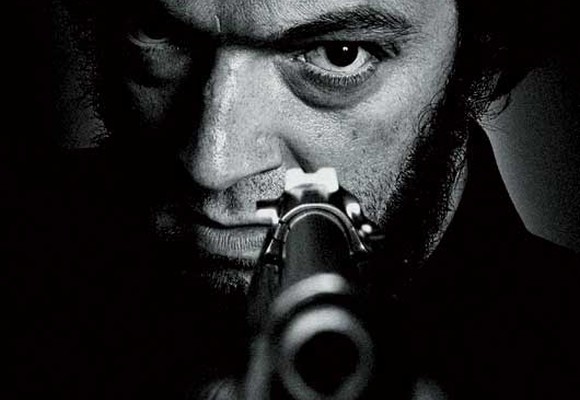Review – Mesrine: Killer Instinct ****
Article published: Wednesday, August 12th 2009
Dir: Jean-Francoise Richet
Starring: Vincent Cassel, Gerard Depardieu, Cecile de France
If Jacques Mesrine was the French John Dillinger, then Killer Instinct is the French Scarface. The first in a two-part biopic based on the title character’s memoir L’Instinct de Mort, Killer Instinct is an aggressive, intelligent and gripping crime thriller that refuses to moralise. The action speaks for itself and the audience is allowed to make up its own mind. And, although the preface makes it clear that the source material may not be entirely accurate, we are left wondering what Mesrine could possibly have left out of his autobiographic tale; it already includes a brutal confrontation with his wife and the abandonment of his children, alongside a string of murders.
 The film begins with Mesrine’s death in 1979, an extra-judicial police killing prompted by his status as Public Enemy Number One (the subtitle of part two). The fact that he had previously escaped jail on three occasions would not have helped.
The film begins with Mesrine’s death in 1979, an extra-judicial police killing prompted by his status as Public Enemy Number One (the subtitle of part two). The fact that he had previously escaped jail on three occasions would not have helped.
Backtracking to 1950s Algeria, we find Mesrine the young soldier refusing to kill a girl during the interrogation of her brother. Being no humanist, he picks an unusual form of dissent by electing to shoot the brother instead. From here we know and follow Mesrine as the witty anti-hero, willing to kill but only within his own code of honour. This code prevents him from killing the unarmed but does not stop him cavorting with far-right nationalist paramilitaries in the OAS, an organisation founded to keep Algeria French. His racism is made explicit in the unsavoury delight he takes while butchering an “Arab” pimp.
Yet, after fleeing France and moving to Quebec, Mesrine becomes ambiguously involved in the Quebecois nationalist movement. Here he ends up in prison after a failed kidnapping but, of course, promptly escapes. There is a new tension in these scenes, due to the justification we feel for his attempt as his treatment in jail basically amounts to torture. Such is his nature, however, he returns shortly after in an attempt to free the remaining fifty-six prisoners. Mesrine’s duplicity is brought to the fore in the conflict of hero and anti-hero, a microcosm of the debate over the nature of the man and his crimes within France. Such is the strength and pace of the narrative that when “End of Part One” appears on screen, it seems amazing that two hours have passed. It is a joy that Part Two awaits.
Vicent Cassel is starting to look like a French De Niro, a title that once unquestionably went (from Anglo-Saxon eyes, at least) to his co-star Gerard Depardieu, who eats up his scenes here as an old, fat, thoroughly unpleasant gangster-fascist.
The film is not perfect: it lacks the sort of detailed character development and Byzantine plot that marks out a Scorsese or Stone picture. It is also short on the political and cultural details that explain why Mesrine chose the life he did and why he was hailed a hero, which may puzzle those who have never heard of him. Mesrine also suffers from the lack of a constant female presence, although the delightfully named Cecile de France plays a feisty mistress/accomplice. These gripes aside, the film makes recent, comparable action-thrillers such as Public Enemies, (although that could include anything since Heat) look pitifully pedestrian.
Ragnor Ironpants
Comments
No comments found
The comments are closed.



